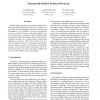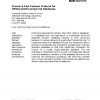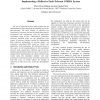121
click to vote
SRDS
2000
IEEE
15 years 6 months ago
2000
IEEE
Group communication systems are powerful building blocks that facilitate the development of fault-tolerant distributed applications. Such systems generally run in an asynchronous ...
SRDS
2000
IEEE
15 years 6 months ago
2000
IEEE
133
click to vote
SRDS
2000
IEEE
15 years 6 months ago
2000
IEEE
Reliable multicast protocols can strongly simplify the design of distributed applications. However, it is hard to sustain a high multicast throughput when groups are large and het...
114
click to vote
SRDS
2000
IEEE
15 years 6 months ago
2000
IEEE
Fault-tolerance is fundamental to the further development of mobile agent applications. In the context of mobile agents, fault-tolerance prevents a partial or complete loss of the...
116
click to vote
SRDS
2000
IEEE
15 years 6 months ago
2000
IEEE
The concept of unreliable failure detector was introduced by Chandra and Toueg [2] as a mechanism that provides information about process failures. Depending on the properties the...
137
click to vote
SRDS
2000
IEEE
15 years 6 months ago
2000
IEEE
The use of reflection becomes today popular for the implementation of non-functional mechanisms such as for fault-tolerance. The main benefits of reflection are separation of conc...
138
click to vote
SRDS
2000
IEEE
15 years 6 months ago
2000
IEEE
One way to implement a fault-tolerant a service is by replicating it at sites that fail independently. One of the replication techniques is active replication where each request i...
123
click to vote
SRDS
2000
IEEE
15 years 6 months ago
2000
IEEE
Obtaining good performance from a distributed replicated database that allows update transactions to originate at any site while ensuring one-copy serializability is a challenge. ...



